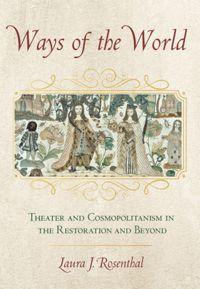Laura J. Rosenthal

Research Expertise
Restoration and 18th Century
Laura J. Rosenthal writes about Restoration and eighteenth-century literature and culture, with particular interests in theater, the novel, gender, sexuality, imperialism, and the history of emotion. Her most recent book is Ways of the World: Theater and Cosmopolitanism in the Restoration and Beyond (Cornell, 2020). Ways of the World reinterprets Restoration and post-Restoration drama as centered on two intertwined projects: imperialism (including the slave trade) and elite ambitions to achieve the cultural sophistication of other contemporary empires (Ottoman, French, Dutch, Spanish). Sometimes the stage supported these ambitions, but other times it confronted the cruelty, violence, and embarrassment of this drive that nevertheless planted the seeds of the British Empire. Rosenthal is currently working on a new project tentatively titled “Savage Indignation: The Enlightenment History of a Political Emotion.”
Professor Rosenthal is also the author of Infamous Commerce: Prostitution in Eighteenth-Century Literature and Culture (Cornell, 2006), which shows how representations of sex work reveal as much about work and emotion as they do about sex in novels (Defoe, Richardson, Fielding); scandal narratives (whore biographies, pornography); travel narratives; and reformist writing. Prostitute narratives capture the alienation and self-division of identity in early capitalism. Most major novelists of the period at one point found meaning in the story of a prostitute not simply (or event at all) as negative examples of ideal womanhood, but rather as figures with which readers were invited to identify. In 2008, Rosenthal published some of the lesser known examples of the genre in Nightwalkers: Prostitute Narratives from the Eighteenth Century (Broadview).
Rosenthal's first book was Playwrights and Plagiarists in Early Modern Drama: Gender, Authorship, Literature Property (Cornell, 1996), which explores the importance of women playwrights, 1650-1740, and the impact of new cultures of property on dramatic authorship. She has also co-edited two collections of essays: one with Donna Weiland called Literary Study, Measurement, and the Sublime: Disciplinary Assessment (Teagle Foundation, 2011) and on with Mita Choudhury) of Monstruous Dreams of Reason: Body, Self, and Other in the Enlightenment (Bucknell, 2002). She won a Newberry/British Academy Award for Research in Great Britain; the Monticello College Foundation Fellowship for study at the Newberry Library; an NEH Summer Award; and a Folger Shakespeare Library Short-Term Fellowship. She has recently served as the ADVANC Professor for the College of Arts and Humanities. She currently serves as the Director for Faculty Leadership and Development in the Office of Faculty Affairs and as editor of the journal Restoration: Studies in Literature and Culture.
Awards & Grants
Director for Faculty Leadership, Office for Faculty Affairs
Laura J. Rosenthal is the current Director for Faculty Leadership, Office for Faculty Affairs.
Author/Lead: Laura J. RosenthalCollege of Arts and Humanities 2012 Faculty Service Award
Award given annually.
Author/Lead: Laura J. RosenthalPublications
Ways of the World: Theater and Cosmopolitanism in the Restoration and Beyond
Ways of the World explores cosmopolitanism as it emerged during the Restoration and the role theater played in both memorializing and satirizing its implications and consequences.
Author/Lead: Laura J. RosenthalRooted in the Stuart ambition to raise the status of England through two crucial investments—global traffic, including the slave trade, and cultural sophistication—this intensified global orientation led to the creation of global mercantile networks and to the rise of an urban British elite who drank Ethiopian coffee out of Asian porcelain at Ottoman-inspired coffeehouses. Restoration drama exposed cosmopolitanism's most embarrassing and troubling aspects, with such writers as Joseph Addison, Aphra Behn, John Dryden, and William Wycherley dramatizing the emotional and ethical dilemmas that imperial and commercial expansion brought to light.
Altering standard narratives about Restoration drama, Laura J. Rosenthal shows how the reinvention of theater in this period—including technical innovations and the introduction of female performers—helped make possible performances that held the actions of the nation up for scrutiny, simultaneously indulging and ridiculing the violence and exploitation being perpetuated. In doing so, Ways of the World reveals an otherwise elusive consistency between Restoration genres (comedy, tragedy, heroic plays, and tragicomedy), disrupts conventional understandings of the rise and reception of early capitalism, and offers a fresh perspective on theatrical culture in the context of the shifting political realities of seventeenth- and eighteenth-century Britain.
Literary Study, Measurement, and the Sublime: Disciplinary Assessment
This volume engages with the perspective of literary study, with essays by education leaders, faculty from English and foreign language departments, and assessment experts that offer a wide range of perspectives.
Author/Lead: Laura J. RosenthalWhat happens when the disciplines make themselves heard in the discussions of learning outcomes assessment that are ubiquitous in higher education today? What do disciplinary perspectives and methodologies have to bring to the table? This volume engages these questions from the perspective of literary study, with essays by education leaders, faculty from English and foreign language departments, and assessment experts that offer a wide range of perspectives. Together, these essays take a pulse of a discipline. They explore what is at stake in the work of assessment in the literature classroom, what we stand to gain, what we fear to lose, and whether current assessment methods can even capture the outcomes we care about most: the complex, subtle, seemingly ineffable heart of learning. They also implicitly invite teachers and scholars in other disciplines to come to the table, and carry the discussion further.
Nightwalkers: Prostitute Narratives from the Eighteenth Century
This anthology makes available for the first time a selection of narratives by and about prostitutes in the eighteenth century.
Author/Lead: Laura J. RosenthalThis anthology makes available for the first time a selection of narratives by and about prostitutes in the eighteenth century. These memoirs, some written by and some about eighteenth-century prostitutes, off important insights into female experience and class and gender roles in the period. Portraying the lives of women in both success and hardship, written in voices from repentant to bawdy, the memoirs show the complexity of the lives of the "nightwalkers."
Read More about Nightwalkers: Prostitute Narratives from the Eighteenth Century
Infamous Commerce: Prostitution in Eighteenth-Century British Literature and Culture
Rosenthal uses literature to explore the meaning of prostitution from the Restoration through the eighteenth century, showing how both reformers and libertines constructed the modern meaning of sex work during this period.
Author/Lead: Laura J. RosenthalRosenthal uses literature to explore the meaning of prostitution from the Restoration through the eighteenth century, showing how both reformers and libertines constructed the modern meaning of sex work during this period. From Grub Street's lurid "whore biographies" to the period's most acclaimed novels, the prostitute was depicted as facing a choice between abject poverty and some form of sex work. Prostitution, in Rosenthal's view, confronted the core controversies of eighteenth century capitalism: luxury, desire, global trade, commodification, social mobility, gender identity, imperialism, self-ownership, alienation, and even the nature of work itself.
Read More about Infamous Commerce: Prostitution in Eighteenth-Century British Literature and Culture
Monstrous Dreams of Reason: Body, Self, and Other in the Enlightenment
Monstrous Dreams of Reason explores of the most enduring and intriguing paradoxes of the British Enlightenment: how reason gives rise to both the beneficial and the monstrous.
Author/Lead: Laura J. RosenthalMonstrous Dreams of Reason explores of the most enduring and intriguing paradoxes of the British Enlightenment: how reason gives rise to both the beneficial and the monstrous. This collection of essays explores the conflicts sparked by the extraordinary range of new ideas and material possibilities in the eighteenth-century British Empire, reading the Enlightenment less a set of axioms then as a variety of cultural and ideological formations. The essays explore a wide range of texts to demonstrate how profoundly eighteenth-century formulations of gender, race, class, and sexuality set the terms for debates in the centuries that followed.
Read More about Monstrous Dreams of Reason: Body, Self, and Other in the Enlightenment
Playwrights and Plagiarists in Early Modern England
Passage of the first copywright law in 1710 marked a radical change in the perception of authorship.
Author/Lead: Laura J. RosenthalPassage of the first copywright law in 1710 marked a radical change in the perception of authorship. According to Laura J. Rosenthal, the new construction of the author as the owner of literary property bore different consequences for women than for men, for amateurs than for professionals, and for playwrights than for other authors. Rosenthal explores distinctions between legitimate and illegitimate forms of literary appropriation in drama from 1650 to 1730. In considering the alleged plagiarists Margaret Cavendish, Aphra Behn, John Dryden, Colley Cibber, and Susanna Centlivre, Rosenthal maintains that accusations had less to do with the degree of repetition in texts than with the gender of the authors and the cultural location of the plays. Questions of literary property, then, became not just legal matters but part of a discourse aimed at conferring or withholding cultural authority.
Read More about Playwrights and Plagiarists in Early Modern England


